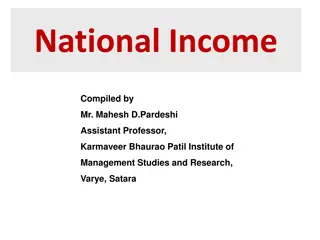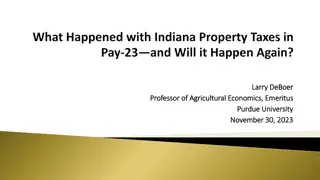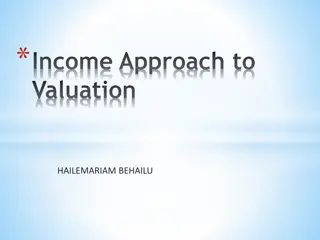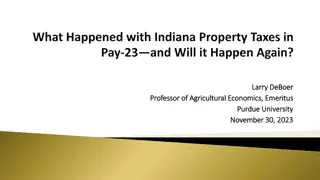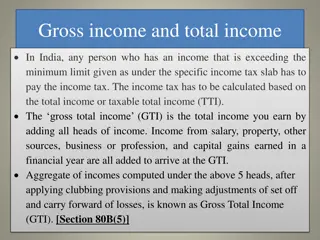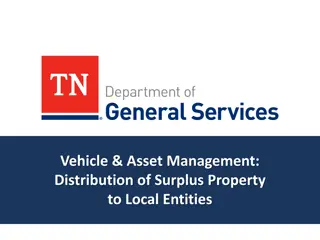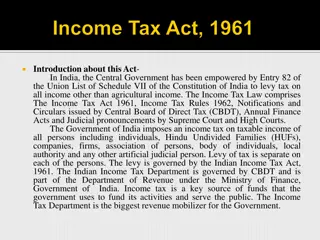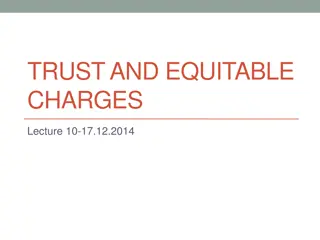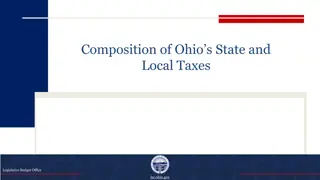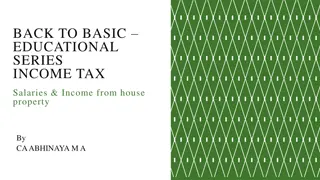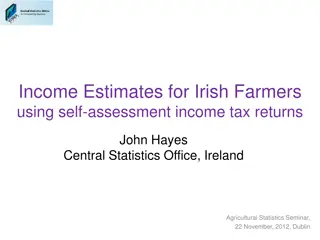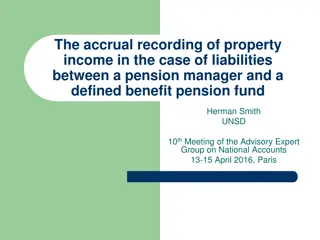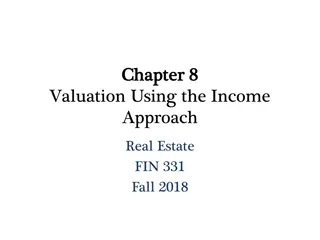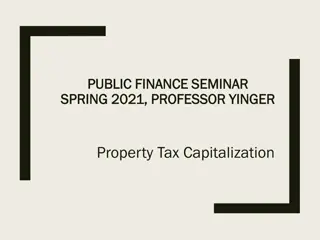Understanding Income from House Property
Income from house property is calculated based on the annual value of the property's income-generating potential. Certain conditions must be met for the property income to be taxable, such as the property consisting of buildings and lands appurtenant thereto and the owner not using it for business purposes. Deemed owners are also identified under specific circumstances. Composite rent, which includes rent for the property and service charges, is assessed accordingly for tax purposes.
Download Presentation

Please find below an Image/Link to download the presentation.
The content on the website is provided AS IS for your information and personal use only. It may not be sold, licensed, or shared on other websites without obtaining consent from the author. Download presentation by click this link. If you encounter any issues during the download, it is possible that the publisher has removed the file from their server.
E N D
Presentation Transcript
BASIS OF CHARGE The basis of calculating income from house property is the annual value annual value. This is the inherent capacity of the property to earn income. The charge is not because of the receipt of any income but is on the inherent potential of the house property to generate income.
CONDITIONS TO BE FULFILLED FOR PROPERTY INCOME TO BE TAXABLE UNDER THIS HEAD The property must consist of buildings and lands appurtenant thereto. The assessee must be the owner of such house property. The property may be used for any purpose but should not be used by the owner for the purpose of any business or profession carried on by him, the profits of which are chargeable to tax.
DEEMED OWNER It is the legal owner of a house property who is chargeable to tax in respect of property income. The following persons are deemed to be owners of the house property for the purpose of computing income from house property. An individual, who transfers house property otherwise than for adequate consideration to his or her spouse (not being a transfer in connection with an agreement to live apart) or to his minor child (not being a married daughter), is deemed owner of the house property.
DEEMED OWNER The holder of an impartible estate is a deemed owner of all properties comprised in the estate. A member of a cooperative society, company or other association of persons, to whom a building or a part thereof is allotted or leased under a house building scheme of the society, company or association of persons, is deemed owner of the property.
COMPOSITE RENT In certain cases, the owner charges rent from the tenant not only on account of rent for the house property but also on account of service charges for various facilities provided with the house. Such rent is known as composite rent. The said composite rent can fall under 2 categories: (a) Composite rent on account of rent for the property and service charges for various facilities provided along with the house like lift, gas, water, electricity, watch and ward, air conditioning etc. In this case such composite rent should be split
COMPOSITE RENT up and the portion of rent attributable to the letting of the premises shall be assessable as Income from house property . The other portion of the composite rent received for rendering services shall be assessable as Income from other sources .
COMPOSITE RENT (b) Composite rent on account of rent for the property and the hire charges of machinery, plant or furniture belonging to the owner. In this case if the letting of the property is separable from the letting of the other assets, then the portion of the rent attributable to the letting of the premises shall be assessable as Income from house property and the other portion of the composite rent for letting other assets shall be assessable either as business income or as other sources . On the other hand, if the letting of the property is inseparable from the letting of other assets like machinery, furniture, the entire income would be taxable as business income or as other sources .
WHEN INCOME FROM HOUSE PROPERTY IS NOT CHARGED TO TAX In the following cases income from property is not charged to tax: Income from any farm house forming part of agricultural income Annual value of any one palace in the occupation of an ex-ruler Income from house property to a local authority
WHEN INCOME FROM HOUSE PROPERTY IS NOT CHARGED TO TAX Income from a house property to an approved scientific research association, to a university or other educational institution, to philanthropic hospital or other medical institution. Property income of: (a)any registered trade union, (b) any political party. Income from house property held for any charitable purposes.
WHAT IS ANNUAL VALUE? As per section 23(1)(a), the annual value of any property shall be the sum for which the property might reasonably be expected to be let from year to year. It may neither be the actual rent derived nor the municipal valuation of the property. It is something like notional rent which could have been derived, had the property been let.
DETERMINING ANNUAL VALUE In determining the annual value there are four factors which are normally taken into consideration. These are: Actual rent received or receivable Municipal Value Fair rent of the property Standard rent
COMPUTATION OF ANNUAL VALUE OF A PROPERTY [SECTION 23(1)] As per Income tax, annual value is the value after deduction of municipal taxes, if any, paid by the owner. Annual value may be determined in the following two steps: Determine gross annual value From gross annual value, deduct municipal taxes paid by the owner during previous year. 1) 2) The balance shall be the net annual value which, as per the Income tax Act, is the annual value.
DIFFERENT CATEGORIES OF PROPERTIES The annual value has to be determined for different categories of properties. These are: (A) House property which is let throughout the previous year (B) House property which is let and was vacant during whole or any part of previous year. (C) House property which is part of the year let and part of the year self occupied. (D) House property which is self -occupied for residential purposes or could not actually be self occupied owing to employment in any other place.
(A)HOUSE PROPERTY WHICH IS LET THROUGHOUT THE PREVIOUS YEAR The annual value of any such property shall be deemed to be: (a) The sum for which the property might reasonably be expected to let from year to year, or (b) where the property or any part of the property is let and the actual rent received or receivable by the owner in respect thereof is in excess of the sum referred to in clause (a), the amount so received or receivable
DETERMINATION OF GROSS ANNUAL VALUE As per clause (a) above, the first step for determining the gross annual value is to calculate the sum for which the property might reasonably be expected to let from year to year. For estimation of the same, the higher of the following two is taken to be the expected rent. Municipal Valuation Fair rent But, in case the property is governed by the Rent control Act, its annual value cannot exceed the standard rent. (i) (ii)
DETERMINATION OF GROSS ANNUAL VALUE To conclude: The first step is to calculate the gross annual value which will be the maximum of Municipal value or fair rent, but restricted to the standard rent. However, if the actual rent received or receivable exceeds such amount then the actual rent so received/receivable shall be the Gross Annual value.
MUNICIPAL TAXES PAID Step 2: Taxes levied by any local authority in respect of the property i.e. municipal taxes (including service taxes) to be deducted: Municipal taxes levied by local authority are to be deducted from the gross annual value, if the following conditions are satisfied: (a) The municipal taxes have been borne by the owner, and (b) These have been actually paid during the previous year.
NET ANNUAL VALUE The value arrived at after deducting the municipal taxes, if any, may be referred to as the Net Annual Value. From such net annual value, deductions permissible under section 24 (a) & (b) are allowed and the balance is the income under the head Income from house property .
DETERMINATION OF INCOME FROM HOUSE PROPERTY Gross Annual Value Less: Municipal Taxes ******* Net Annual Value ******* Less: Deduction under section 24 Standard Deduction (@30%) ******* ******* Income from House Property Income from House Property ******* Interest on borrowed capital *******



